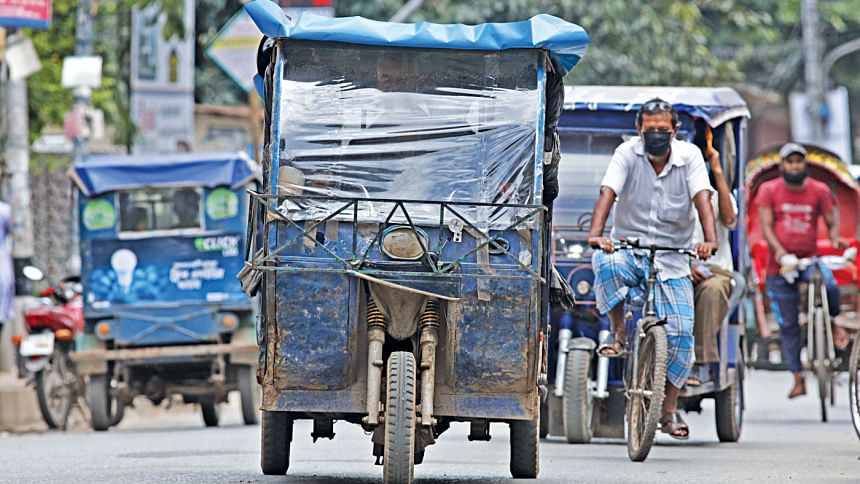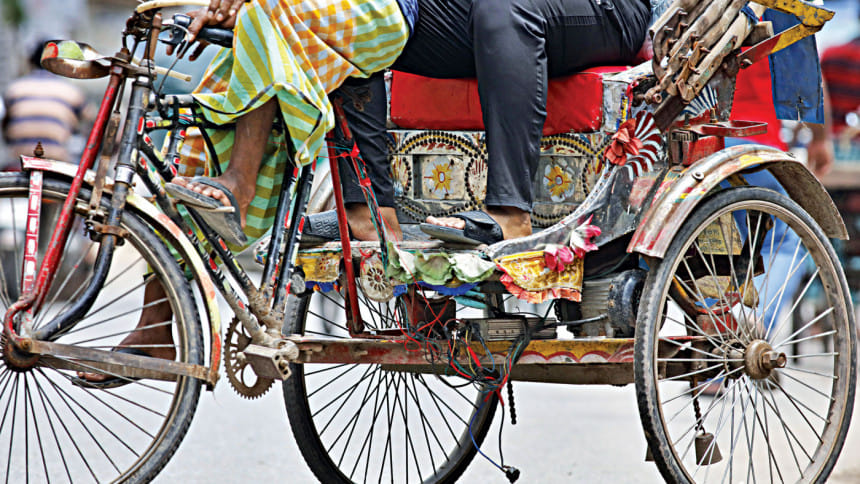Battery-run rickshaws still rule the alleys

Although plying of battery-run rickshaws and rickshaw-vans in the capital is illegal, no one gets surprised when they see these vehicles parked at the corner of a street or moving throughout the alleys in full speed.
Dhaka South City Corporation (DSCC) Mayor Sheikh Fazle Noor Taposh on Sunday announced to take legal action against all such vehicles from that very day, but the situation remains the same.
Movement of these three-wheelers is quite risky on roads, so the government made them unlawful. The High Court on March 8, 2015 banned plying of mechanised and battery-run rickshaws across the country, as they have no proper licence.

Crores of taka circulate in this sector, as many ruling-party individuals and local influential are behind running these vehicles in the capital, according to sources. They take Tk 20-30 from each rickshaw-driver daily, and provide them with a card to paste on their rickshaws, which works as permission.
These illegal vehicles are running under different area-based informal "samity".
A DSCC official said they are going to act against such rickshaws shortly, as the risks they pose are significant. Although there is no record of the total number of such vehicles, he estimated it to be from 30,000-40,000.
He said LGRD ministry on July 21, 2013 issued an order to Dhaka city corporations, asking them not to give licence to these three-wheelers.
The Standing Committee on Local Government on September 1, 2013 also recommended that Local Government Division and the corporations take steps against battery-rickshaws.
DSCC Public Relations Officer Md Abu Nasher told The Daily Star that they are observing the situation and will conduct drives at an opportune time. He did not elaborate any further.
Kazi Md Shifun Newaz, assistant professor of Accident Research Institute at Bangladesh University of Engineering and Technology, said there is huge safety concern centring battery-rickshaws, as they move fast but do not have the structure to control such speeds.
He said these vehicles also confuse drivers, as they move like regular rickshaws but are much quicker. They also waste electricity, as their batteries are recharged via illegal electric lines.
According to the institute's recorded statistics, every year, seven to eight percent of accidents occur due to such vehicles across the country.
Abdul Gani, who rents-outs his three battery-rickshaws in Gandaria, said they are still running the rickshaws, as they have not faced any problem yet. He said they must give Tk 30 per day to a local "samity" for the permission cards. The samity uses the symbol of a butterfly for permitted rickshaws.
"I will convert the battery-rickshaws to regular ones if we cannot run them," Gani said, adding that he gets Tk 350 daily from a battery-rickshaw driver, but only Tk 120 from a regular one. It takes Tk 50,000-55,000 to make a battery-rickshaw, and Tk 80 to recharge one daily, he added.
Another owner of a battery-rickshaw, Idris Mia of Old Dhaka, said he did not hear any news of banning the rickshaws. He also must give Tk 600 monthly to a samity.
He will face severe problems if the city corporation conducts drives, as he purchased the rickshaw only a few months back, taking loan from a samity, he said.
"I switched to this profession during the shutdown, as I lost my earlier job in a bookbinding factory. If I fail to earn from the rickshaw, I don't know how I'll run my family," he continued.
Contacted, a staffer of the samity using the butterfly mark, wishing to remain anonymous, said they have around 400 battery-rickshaws under them in Postogola area.
He said they did not decide on what they will do regarding the mayor's move.

 For all latest news, follow The Daily Star's Google News channel.
For all latest news, follow The Daily Star's Google News channel. 



Comments